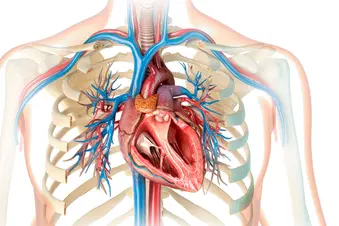
By Steven Schiff, MD, as told to Stephanie Booth
My patients’ concerns about heart failure are usually, “What is my prognosis?” “What are the treatments, like medication and surgery, that are available to me?” But some people will ask me for their ejection fraction (EF) number if they’ve read about it, or had it discussed with them. This is especially true if they want to know if it’s changing over time.
What is EF?
EF is one of many measurements of how well your heart works. It measures the active pump function of your heart when it contracts and pumps blood out of your heart and into your arteries.
Technically, EF is the percentage (fraction) of blood that is ejected from your heart as it contracts. (This is also known as the stroke volume).
Mathematically, EF is the amount of blood pumped with each beat, divided by the amount of blood in the chamber when it’s filled.
Your heart has two phases for each heartbeat:
- A filling phase (diastole)
- A contraction or emptying phase (systole)
Therefore, EF is the stroke [contracted] volume/diastolic volume.
What does EF have to do with heart failure?
A low ejection fraction lets a doctor know that the active pumping phase of the heart isn't working. It's usually tied to some, but not all, types of heart failure.
Heart failure with a low EF is called "systolic" heart failure.
How is EF measured?
EF is usually measured, with an echocardiogram or cardiac ultrasound. It can also be measured during a heart angiogram and catheterization. That’s when catheters (tubes) are put inside of you through an artery, into your heart chambers.
Other measurement techniques include:
- Cardiac MRI
- Cardiac nuclear scans
- Cardiac CT scans
All of these techniques are estimates, and can show slightly different results in the same person.
What do EF numbers mean?
Normal EF is in the range of 55% to 70%. As the percentage falls, it tells the doctor that the heart failure is getting worse. In general, if the EF falls below 30%, it's relatively severe. A reading of 20% or below is very severe heart failure.
It’s important to know that there’s not always a perfect correlation between symptoms and the EF. In addition, an EF above 75% is considered too high, and can be a problem as well.
How can your EF help manage your heart health?
Your EF can be a way of assessing the status and progression of heart failure over time, as well as a way to track the benefits of various heart failure treatments.
For instance, you may be told your EF, then start on medication or go for surgery, and may want to know: "Did my EF go up or down?" We can track serial measurements of EF (usually by echocardiogram) to see if your treatment is helping.
How can you have normal EF and heart failure?
Heart failure with a normal EF is happening more and more often. It's generally related to the filling phase of the heart's cycle of filling and emptying. It is called "diastolic heart failure.”
Normal hearts are very compliant. This means that they fill easily, at relatively low pressures. Sometimes, even though the heart contracts normally (normal EF), it might need higher pressure to fill for each beat.
If so, you can have symptoms of heart failure even though your heart contracts normally, with a normal EF. You could have fluid accumulation and overload. We see this most frequently in people with untreated high blood pressure.
Should you find out your EF?
Most people without cardiac issues don't need to know their EF.
If you’re simply worried about this, ask your doctor if you should be concerned. A simple echocardiogram will provide a good estimate.
The most important thing to know, if you have been told of heart failure, is what the underlying cause is. That will affect your prognosis, treatment, testing and follow-up.
Among the most common causes [of heart failure] are:
- Coronary artery disease
- Heart attacks
- High blood pressure
- Heart valve problems
Once you’ve been given a heart failure diagnosis, you should be seen by a cardiologist for a careful review of your underlying causes, the status of your heart failure, your current treatment, follow up, and prognosis.
Show Sources
Photo Credit: LEONELLO CALVETTI/SCIENCE PHOTO LIBRARY / Getty Images
SOURCE:
Steven Schiff, MD, cardiologist, medical director of invasive cardiology, and service chief of cardiology of MemorialCare Heart & Vascular Institute, Orange Coast Medical Center, Fountain Valley, CA.